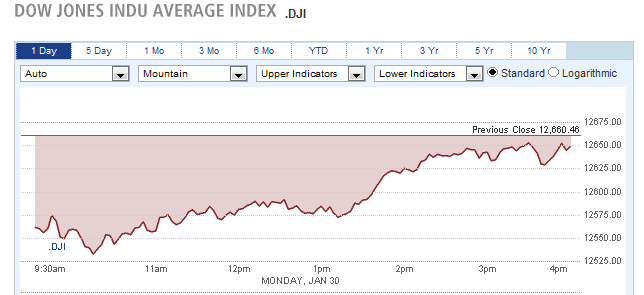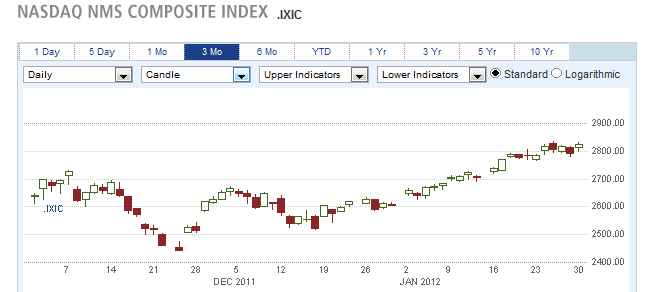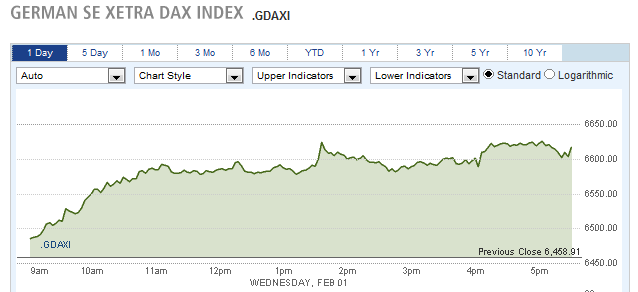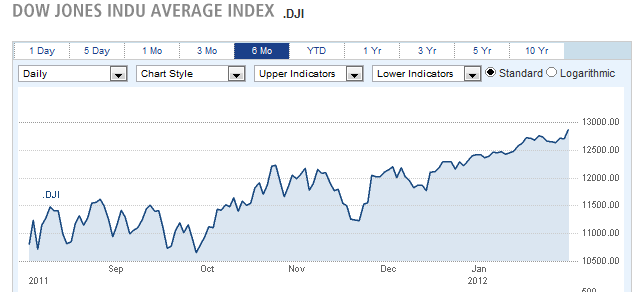The week opened on a soft note as Asian markets declined. The Nikkei sagged .5% to 8793, as Mitsubishi Electric tumbled 15% after the government suspended dealings with the machinery-maker, due to accusations of overcharging. The Kospi and Hang Seng skidded 1.2%, and the Shanghai Composite dropped 1.5% as trading resumed after the week-long Lunar New Year. Australia’s ASX 200 posted a modest .4% loss.
Greece failed to reach a deal with private debt holders, pressuring European indexes. Banking shares fell 3.1%. The CAC40 slumped 1.6%, the FTSE fell 1.1%, and the DAX lost 1%. French Banks bore the brunt of the selling, as BNP Paribas, Societe Generale, and Credit Agricole each fell at least 6.5%. Yields on Portuguese debt continued to climb, amid mounting concerns that the country may need another bailout.
US stocks opened sharply lower, but they recovered most of their losses by the close. The Dow eased a mere 7 points to 12654, after falling as much as 130 points in the first hour of trading. The S&P 500 fell .3% to 1313, and the Nasdaq declined .2%.
Dow Pares Losses in Afternoon Advance
Bank of America dropped 3% after Goldman Sachs downgraded the stock to “neutral” from “buy”. Goldman Sachs upgraded Morgan Stanley, but the stock still fell 1.9%.
Currencies
The Yen soared 1.4% to 76.34, a 3-month high, while the Dollar traded modestly lower against most other currencies. The Euro ticked up .2% to 1.3130, the Swiss Franc advanced .3% to 1.0896, and the Pound edged up 8 pips to 1.5701. The Australian Dollar eased .3% to 1.0596, as a drop in commodity prices weighed on the currency.
Economic Outlook
Personal income rose by .5% last month, slightly more than expected, but personal spending, which is considered more important, remained flat, falling short of forecasts for a .2% increase.
January Closes Quietly as Stocks Post Large Monthly Gains
Equities
Asian markets advanced moderately on Tuesday. The Kospi climbed .8% to 1956, the Hang Seng rallied 1.1%, and the Shanghai Composite added .3% to 2293. Lagging behind, the Nikkei inched up .1% to 8803, while the ASX 200 slipped .2%.
European markets gained as well, despite weaker than expected data from the US. The CAC40 posted a solid 1% gain, while the DAX and FTSE rose a modest .2%. Hopes lingered on for a Greek debt deal, while pressure mounted on the heavily-indebted country to undertake steep spending cuts.
US stocks closed little changed, overcoming earlier losses. The Dow slipped 21 points to 12634, the S&P 500 closed flat at 1312, and the Nasdaq gained 2 points to 2814. Nonetheless, January was an extremely strong month for stocks, as the Dow climbed 3.4%, the S&P 500 advanced 4.4%, and the Nasdaq soared 8%.
Nasdaq Soars 8% in January
RadioShack tumbled 30% after issuing a profit warning, dropping to a 3-year low. Mattel advanced 5% on strong earnings, while UPS slipped .7% despite exceeding analyst forecasts.
Currencies
The Dollar was mixed as US growth concerns weighed against European debt troubles. The Euro ticked down .4% to 1.3080, and the Swiss Franc shed .3% to 1.0864. The Pound and Australian Dollar both gained .3% to 1.5760 and 1.0617 respectively, and the Yen rose .2% to 76.22.
Economic Outlook
Tuesday’s sobering economic data reawakened doubts over the pace of the US economic recovery. The Case Shiller home price index fell by 3.7%, significantly worse than last month’s 3.4% drop. Chicago PMI dropped to 60.2 from 62.5. Consumer confidence slumped to 61.1 from 64.8, whereas analysts had expected an increase to 68.2.
Western Stocks Rally, Boosted by Positive Data
Equities
Asian markets ended mixed after conflicting data from China failed to provide direction. The official PMI data pointed to an expansion in manufacturing, while HSBC PMI data indicated a mild contraction. The Shanghai Composites slumped 1.1%, the ASX 200 dropped .9%, and the Hang Seng dipped .3%. Amongst the gainers, the Nikkei inched up .1%, and the Kospi edged up .2%. Korean builders soared, as Samsung Engineering and Hyuandai Engineering both gained nearly 5%.
European markets rallied strongly, supported by upbeat economic news from Germany and the US. The DAX surged 2.4%, the CAC40 climbed 2.1%, and the FTSE jumped 1.9%. Banking shares rebounded 3.8% on news a Greek debt deal was imminent.
DAX Rallies 2.4% on Strong German Manufacturing Data
US stocks climbed as well. The Nasdaq outperformed, closing up 1.2%, followed by the S&P 500, which rose .9% to 1324. The Dow rose 84 points to 12716, ending its 4-day slide.
Currencies
The Dollar settled modestly lower against global currencies. The Euro rose .5% to 1.3156, recovering from an earlier drop down to 1.3028. The Australian Dollar settled up .7% to 1.0698, while the Pound and Swiss Franc advanced .4%. The Canadian Dollar broke through the parity level, gaining .3% to .9988, and the Yen inched up .1% to 76.22.
Economic Outlook
Wednesday’s ADP Employment report showed the economy gained 170K jobs last month, falling short of expectations of 189K, but still a very respectable figure. The official government non-farm payroll report will be released on Friday.
Asia and Europe Rally, US Ends Mixed
Equities
Following the West’s lead on Wednesday, Asian markets rallied on Thursday. The Nikkei gained .8% to 8877, as financial stocks led the gains. Sharp tumbled 16% to a 31-year low after warning of a record loss for the upcoming year. The Kospi climbed 1.3%, as LG Electronics advanced 7.4%, posing its 9th straight gain. In China, the Hang Seng and the Shanghai Composite both soared 2%, while Australia’s ASX 200 advanced 1%.
European markets posted modest gains, led by materials stocks, which posted a gain of 2.7%. The DAX rose .6%, the CAC40 edged up .3%, and the FTSE ticked up .1%
Mining group, Xstrata, soared 9.9% after confirming it was involved in merger talks with commodity trader, Glencore. Glencore shares surged 6.9%.
US stocks ended mixed as traders prepared for Friday’s job report. The Dow slipped 11 points to 12705, the Nasdaq advanced .4%, and the S&P 500 edged up .1%.
Currencies
Currencies traded in narrow ranges, with the Dollar moving up slightly. The Euro and Swiss Franc both slipped .2% to 1.3149 and 1.0912 respectively, and the Pound lost .3% to 1.5807. The Yen and Australian Dollar closed flat.
Economic Outlook
Weekly jobless claims fell to 367K, 6K better than forecast. Labor costs rose more than expected, while productivity increased less than expected, both positive developments for the employment situation.
US Jobs Data Blows Past Forecasts, Stocks Rally
Equities
Asian markets traded mostly lower as weaker-than-expected data from China weighed on shares. The Nikkei declined .5% to 8832, while Sony shares surged 8.1% after the company announced a new CEO would take over. Korea’s Kospi slid .6%, and the ASX 200 eased .4%. Chinese markets gained, with the Shanghai Composite rising .5%, and the Hang Seng inching up .1%.
US payroll data blew past analyst estimates of 150k, with the economy gaining 243K jobs last month. The unemployment rate slipped to 8.3% from 8.5%. The good news pushed European markets higher in the afternoon. The FTSE jumped 1.8%, the DAX advanced 1.7%, and the CAC40 gained 1.5%.
In the US stocks rallied, with the Dow closing up 157 points to 12862, its highest closing level since May 2008. The Nasdaq surged 1.6% to its highest level in a decade, and the S&P 500 climbed 1.5%. The VIX tumbled 4.9% to 17.10, a sign of increasing investor confidence.
Dow Rallies to 3.5 Year High
Gilead Sciences surged 11% after announcing promising results from its experimental hepatitis C treatment.
Currencies
Despite the strong economic data, the Dollar traded moderately lower on Friday, as traders moved back into risk-on mode. The Canadian Dollar led the gains, rising .6% to .9936, despite weaker than expected Canadian employment data. The Australian Dollar gained .5% to 1.0762, and the Euro ticked up .1% to 1.3160. Bucking the uptrend, the Yen fell .5% to 76.60, and the Swiss Franc eased .1% to 1.0896.
Economic Outlook
Aside from the strong jobs data, ISM non-manufacturing PMI advanced to 56.8, up from last month’s 52.6. Factory orders were slightly disappointing, rising only 1.1%, whereas economists had forecast a gain of 1.5%.
- English (UK)
- English (India)
- English (Canada)
- English (Australia)
- English (South Africa)
- English (Philippines)
- English (Nigeria)
- Deutsch
- Español (España)
- Español (México)
- Français
- Italiano
- Nederlands
- Português (Portugal)
- Polski
- Português (Brasil)
- Русский
- Türkçe
- العربية
- Ελληνικά
- Svenska
- Suomi
- עברית
- 日本語
- 한국어
- 简体中文
- 繁體中文
- Bahasa Indonesia
- Bahasa Melayu
- ไทย
- Tiếng Việt
- हिंदी
Greece Debt Deal Remains Elusive, Consumer Spending Disappoints
Published 02/27/2012, 05:38 AM
Updated 05/14/2017, 06:45 AM
Greece Debt Deal Remains Elusive, Consumer Spending Disappoints
Equities
Latest comments
Loading next article…
Install Our App
Risk Disclosure: Trading in financial instruments and/or cryptocurrencies involves high risks including the risk of losing some, or all, of your investment amount, and may not be suitable for all investors. Prices of cryptocurrencies are extremely volatile and may be affected by external factors such as financial, regulatory or political events. Trading on margin increases the financial risks.
Before deciding to trade in financial instrument or cryptocurrencies you should be fully informed of the risks and costs associated with trading the financial markets, carefully consider your investment objectives, level of experience, and risk appetite, and seek professional advice where needed.
Fusion Media would like to remind you that the data contained in this website is not necessarily real-time nor accurate. The data and prices on the website are not necessarily provided by any market or exchange, but may be provided by market makers, and so prices may not be accurate and may differ from the actual price at any given market, meaning prices are indicative and not appropriate for trading purposes. Fusion Media and any provider of the data contained in this website will not accept liability for any loss or damage as a result of your trading, or your reliance on the information contained within this website.
It is prohibited to use, store, reproduce, display, modify, transmit or distribute the data contained in this website without the explicit prior written permission of Fusion Media and/or the data provider. All intellectual property rights are reserved by the providers and/or the exchange providing the data contained in this website.
Fusion Media may be compensated by the advertisers that appear on the website, based on your interaction with the advertisements or advertisers.
Before deciding to trade in financial instrument or cryptocurrencies you should be fully informed of the risks and costs associated with trading the financial markets, carefully consider your investment objectives, level of experience, and risk appetite, and seek professional advice where needed.
Fusion Media would like to remind you that the data contained in this website is not necessarily real-time nor accurate. The data and prices on the website are not necessarily provided by any market or exchange, but may be provided by market makers, and so prices may not be accurate and may differ from the actual price at any given market, meaning prices are indicative and not appropriate for trading purposes. Fusion Media and any provider of the data contained in this website will not accept liability for any loss or damage as a result of your trading, or your reliance on the information contained within this website.
It is prohibited to use, store, reproduce, display, modify, transmit or distribute the data contained in this website without the explicit prior written permission of Fusion Media and/or the data provider. All intellectual property rights are reserved by the providers and/or the exchange providing the data contained in this website.
Fusion Media may be compensated by the advertisers that appear on the website, based on your interaction with the advertisements or advertisers.
© 2007-2025 - Fusion Media Limited. All Rights Reserved.
